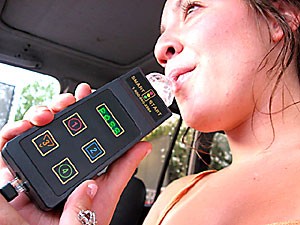As of last Wednesday, anyone convicted of a DUI, especially first-time offenders, will have a mandatory ignition-interlock device installed into their cars for a minimum of 12 months.
The device, similar to a Breathalyzer, requires the driver to submit a breath sample before the vehicle can start, and prevents anyone from driving the vehicle if their blood-alcohol content is 0.03 or higher. A person has three chances to blow a good sample before the device shuts down and requires recalibration.
“”This is an out-of-the-box solution to drunk driving,”” said Rep. David Schapira, D-Tempe, who sponsored the bill. “”This has been an issue in the back of my mind since I was 16 and I was nearly killed by a drunk driver.””
Another reason for the law is that Arizona had the sixth-highest number of alcohol-related fatalities in the nation, according to National Highway Traffic Safety Administration records. From 2005 to 2006, there was a 15 percent increase in alcohol-related fatalities in which the BAC involved was 0.01 or higher.
When Gov. Janet Napolitano signed the bill into law, Arizona enacted one of the country’s toughest DUI laws, mirrored only by one other state, New Mexico. By Jan. 1, however, Illinois and Louisiana will have similar DUI ignition-interlock laws enacted.
A driver convicted of a DUI will be required to install the device for a period ranging from one to two years, depending on the severity of the offense.
The law has a new classification for “”super-extreme”” DUI offenders, whose BAC is .20 or above, more than double the legal limit of .08 percent.
These drivers will have the device for at least 24 months and will also have to spend 45 days in jail.
“”Last year we made about 80 DUI-related arrests,”” said Kevin Haywood, University of Arizona Police Department commander. “”The enforcement of DUI laws is virtually the same. It is simply the penalty phase that is changed.””
If a person is
The whole idea is to prevent someone from starting the car and killing a 12-pack.
-Gary Johns,
franchise holder, Smart Start Inc.
convicted in court on DUI charges, the duration of the ignition-interlock device requirement will be extended for no more than one additional year, on top of added fees.
“”In Arizona there are a total of about 7,000 units on the streets,”” said Gary Johns, franchise holder for Smart Start Inc., one of the leading interlock device companies in the state. “”I think that the state will see at least an additional 12,000 this year.””
A driver can expect to pay $70-80 a month for recalibration of the unit, but extra charges are added if the car experiences a “”lock-out,”” which costs an additional $25-50. Some companies charge for installation of the device, which ranges from $20-250.
Within five minutes of starting the car, the ignition-interlock device will require the driver to perform a rolling retest to make sure that alcohol has not been consumed since ignition, Johns said.
The driver has six minutes to perform the re-test, if necessary, he said. If the driver fails to finish the test, he or she loses one of the six points given to drivers every month.
Once all of the points are used, the driver has 48 hours to take the device to a Smart Start office for recalibration, he said.
“”With our device, you blow and hum for about six seconds to start the car,”” Johns said. “”After that, the device will ask for more re-tests randomly throughout your drive.””
“”On a trip from Tucson to Phoenix, a driver could expect to be tested five to six times,”” he said. “”The whole idea is to prevent someone from starting the car and killing a 12-pack.””









